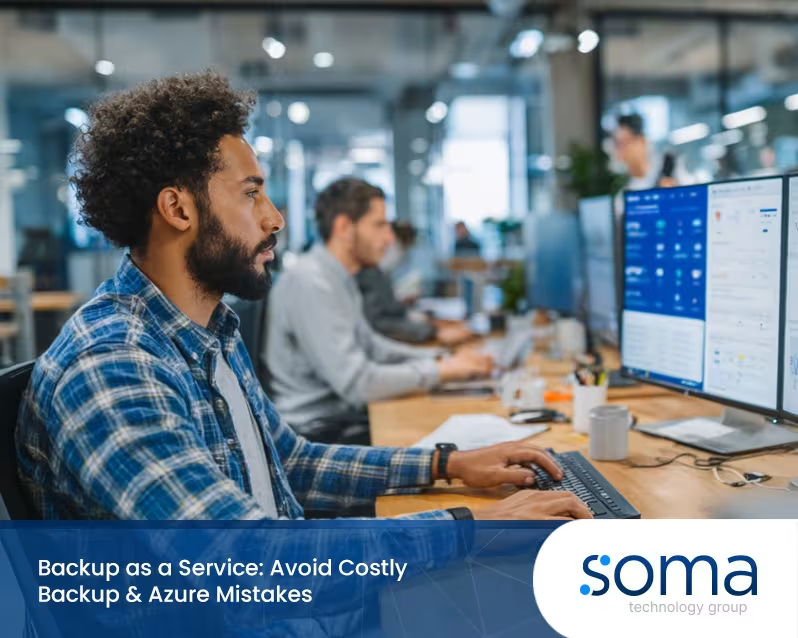
Endpoint Protection vs. Antivirus Software: The EDR and Antivirus Difference
The need for robust endpoint protection has become increasingly important. You understand the constant threat posed by malware, viruses, and other security threats. Your organisation relies heavily on technology, and with that dependence comes the responsibility to safeguard your sensitive data and ensure uninterrupted operations.
With an overwhelming number of options available, it’s easy to feel confused about whether you need antivirus software or a more comprehensive endpoint security solution. This blog aims to clarify the difference between endpoint protection vs. traditional antivirus, helping you make an informed decision that aligns with your specific security needs.
Let’s dive into the intricacies of endpoint protection and explore how it can be a game-changer for your business.

What is endpoint protection?
Endpoint protection refers to a comprehensive security strategy designed to protect endpoints—such as computers, mobile devices, and servers—from a myriad of threats. Unlike traditional antivirus software, which primarily focuses on detecting and eliminating known malware, endpoint protection employs a multi-layered approach. This includes advanced techniques such as endpoint detection and response (EDR), which continuously monitors endpoints for suspicious activity and responds to potential threats in real time.
With cyberattacks becoming increasingly sophisticated, relying solely on outdated antivirus programs is no longer sufficient. Endpoint protection encompasses a range of features, including:
- Real-time monitoring: Constantly observes your endpoints for unusual behaviour.
- Malware detection: Identifies and neutralises malicious software before it can inflict damage.
- Threat intelligence: Utilises up-to-date information about potential threats, helping to proactively defend against emerging risks.
- Response capabilities: Allows businesses to quickly address security incidents, minimising potential damage.
The benefits of endpoint protection
Investing in endpoint protection offers a myriad of benefits that directly address the needs and concerns of business owners like you. Here’s how it can transform your security strategy and provide peace of mind:
Comprehensive coverage
Unlike traditional antivirus software, which may only provide basic protection, endpoint protection encompasses various security measures. This includes malware detection, threat detection, and anti-phishing protection, offering a well-rounded defence against various attack vectors.
Proactive threat management
One of the standout features of endpoint protection is its ability to anticipate and neutralise threats before they cause harm. With advanced features like machine learning and real-time monitoring, it continuously adapts to new threats, ensuring your business remains a step ahead.
Improved incident response
In the event of a security breach, having an effective endpoint security solution enables swift action. The endpoint detection and response (EDR) capabilities allow your team to quickly identify and isolate threats, minimising downtime and potential data loss.
Reduced risk of data breaches
Protecting sensitive customer and business data is a top priority for any business. By implementing robust endpoint protection, you significantly lower the risk of data breaches, safeguarding your reputation and maintaining client trust.
Simplified security management
Many endpoint security tools come with centralised management systems, streamlining security policies across your network. This makes it easier for your IT team to manage, monitor, and update security measures from a single dashboard.

What is antivirus software?
Antivirus software has been a staple in cybersecurity for decades, designed primarily to detect and eliminate malware and other forms of malicious software. Its core functionality revolves around identifying known threats using a database of signatures, which are essentially fingerprints of malicious files. When your system encounters a file that matches one of these signatures, the antivirus program takes action—whether that be quarantine, deletion, or repair.
While traditional antivirus solutions offer a baseline level of protection, they have limitations:
- Signature-based detection: The reliance on signatures means that if a new type of malware emerges that hasn't been catalogued, your antivirus software may not be able to detect it. This leaves gaps in your security that could be exploited by cybercriminals.
- Limited scope: Most antivirus programs focus on preventing known threats rather than addressing the complex landscape of modern cyber threats. As businesses increasingly rely on mobile devices and remote work, the need for more robust protection becomes clear.
- Reactive nature: Traditional antivirus operates reactively, responding to threats after they’ve been detected. This approach can lead to significant damage before a threat is neutralised.
The benefits of antivirus software
Despite its limitations, antivirus software still plays a vital role in any comprehensive cybersecurity strategy. Here are some key benefits that make it an essential component for businesses:
Basic protection
At its core, antivirus software provides essential security against well-known malware and viruses. It acts as the first line of defence, helping to prevent common threats from infiltrating your systems.
Cost-effectiveness
For smaller businesses or startups, investing in traditional antivirus solutions can be more budget-friendly compared to comprehensive endpoint protection systems. This allows smaller operations to maintain a level of security without breaking the bank.
User-friendly interfaces
Many antivirus programs offer intuitive interfaces that make it easy for users to navigate and understand their security status. This simplicity can be beneficial for businesses without dedicated IT staff.
Scheduled scans and updates
Antivirus software often includes features for automated scans and regular updates. This ensures your systems are continually checked for threats and that the software is equipped with the latest signatures to combat newly identified malware.
Minimal system impact
Most modern antivirus solutions are designed to have a minimal impact on system performance, allowing your team to work without significant slowdowns or disruptions. This is particularly important for businesses that rely on technology for daily operations.

Endpoint protection vs. antivirus software: The key difference
Understanding the difference between endpoint protection and antivirus software is critical for any business owner looking to enhance their cybersecurity strategy. While both aim to protect your systems, they do so in fundamentally different ways.
Scope of protection
- Antivirus software: Primarily focuses on detecting and removing known threats. Its functionality is limited to scanning files for malware signatures, meaning it’s reactive rather than proactive.
- Endpoint protection: Offers a comprehensive approach that encompasses various security measures, including malware detection, real-time monitoring, and endpoint detection and response (EDR) capabilities. This allows for ongoing protection against a broader range of threats.
Response capabilities
- Antivirus software: When a threat is detected, the software typically quarantines or removes the malicious file, but it may not address the underlying vulnerabilities that allowed the threat to enter your system in the first place.
- Endpoint protection: Not only detects threats but also provides tools to investigate incidents, mitigate damage, and remediate vulnerabilities. It actively monitors for suspicious behaviour, enabling a quicker response to potential attacks.
Adaptability to new threats
- Antivirus software: Relies on a database of known threats, meaning it can struggle with new or advanced malware that hasn't yet been identified.
- Endpoint protection: Utilises advanced technologies like machine learning and threat intelligence to identify and respond to emerging threats. This proactive stance makes it better suited for today’s complex cybersecurity landscape.
Integration and management
- Antivirus software: Typically operates as a standalone solution, making it less effective when integrated into a larger security ecosystem.
- Endpoint protection: Often includes centralised management tools that allow for streamlined monitoring and policy enforcement across all endpoints, enhancing overall security management.
How to know what’s best for your business
Choosing between endpoint protection and antivirus software can feel overwhelming, especially with the stakes so high. To make an informed decision that aligns with your business’s unique needs, consider the following factors:
Assess your business size and complexity
If you’re running a small business with limited technology use, traditional antivirus software may suffice for basic protection. However, if your business relies heavily on digital operations, handling sensitive data or customer information, investing in endpoint protection is crucial.
Evaluate your risk exposure
Understand the potential threats your business faces. If you frequently deal with sensitive information, such as financial records or personal data, the need for a comprehensive endpoint security solution becomes clear. Assessing your risk exposure can help you determine the level of protection necessary.
Consider your budget
Budget constraints often play a significant role in decision-making. Traditional antivirus solutions tend to be more cost-effective for smaller operations. However, weigh the potential costs of a security breach against the investment in endpoint protection. A single incident could far exceed the cost of implementing robust security measures.
Examine your existing IT resources
If your organisation has a dedicated IT team, implementing an endpoint protection solution can be more manageable. These systems often require regular monitoring and management. Conversely, if your resources are limited, straightforward antivirus software might be easier to handle.
Research compliance requirements
Depending on your industry, you may have specific compliance requirements regarding data protection. Ensure that whichever solution you choose meets these standards. Endpoint protection typically offers features that align better with stringent compliance mandates.
Seek expert guidance
Don’t hesitate to consult with cybersecurity experts or service providers. They can assess your current security posture and recommend solutions tailored to your business’s specific needs. Their insights can be invaluable in navigating the complexities of cybersecurity.
Final thoughts
To protect your business, understanding the distinction between endpoint protection and antivirus software is important. While traditional antivirus solutions provide a necessary line of defence, they often fall short. On the other hand, comprehensive endpoint protection not only detects and neutralises known threats but also anticipates and responds to emerging risks, offering you a robust security framework.
As a business owner in Queensland, you deserve a security solution that meets your unique needs and provides peace of mind. Whether you choose to invest in antivirus software for basic protection or opt for a more advanced endpoint protection system, the key is to make an informed decision that aligns with your operational requirements, budget, and risk exposure.
If you’re ready to enhance your cybersecurity strategy and explore tailored solutions, soma technology group can help. With our expertise and a commitment to supporting Queensland businesses, we’re dedicated to keeping your systems and data safe.
Frequently asked questions
What is the difference between endpoint security and traditional antivirus software?
Endpoint security encompasses a broader range of security measures, including real-time monitoring and endpoint detection and response (EDR) capabilities, while traditional antivirus software primarily focuses on detecting and removing known malware.
How does EDR enhance endpoint security?
EDR solutions provide advanced threat response capabilities, allowing organisations to detect, investigate, and respond to security incidents in real time, significantly improving their overall security posture.
What are the key differences between endpoint protection and antivirus software?
The primary differences lie in their scope and functionality. Endpoint protection offers comprehensive protection against various threats, while traditional antivirus solutions focus on signature-based detection of known malware.
When should I choose antivirus vs. endpoint protection?
If your business handles sensitive data and is at a higher risk of cyber threats, opting for endpoint protection is advisable. For smaller operations with limited technology use, antivirus software may be sufficient.
How does the endpoint security vs. antivirus software comparison impact my security needs?
Understanding the difference between endpoint solutions allows you to select a security system that aligns with your specific security requirements, ensuring you adequately protect your assets against evolving threats.
Can antivirus and endpoint security work together?
Yes, implementing both antivirus software solutions and endpoint protection can provide a multi-layered approach to security, enhancing your defences against potential threats across your entire network.
.svg)
%20(1).webp)


